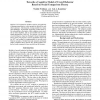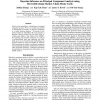306 search results - page 49 / 62 » A framework for the simulation of agents with emotions |
ICAC
2005
IEEE
14 years 1 months ago
2005
IEEE
Service-oriented architectures enable services to be dynamically selected and integrated at runtime, thus enabling system flexibility and adaptiveness—autonomic attributes that...
AAAI
2008
13 years 9 months ago
2008
Automated generators for synthetic models and data can play a crucial role in designing new algorithms/modelframeworks, given the sparsity of benchmark models for empirical analys...
AAAI
2007
13 years 9 months ago
2007
Models of crowd behavior facilitate analysis and prediction of human group behavior, where people are affected by each other’s presence. Unfortunately, existing models leave man...
AAAI
2004
13 years 8 months ago
2004
Based on the probabilistic reformulation of principal component analysis (PCA), we consider the problem of determining the number of principal components as a model selection prob...
AAAI
1996
13 years 8 months ago
1996
This work presents a generalized theoretical framework that allows incorporation of opponent models into adversary search. We present the M algorithm, a generalization of minimax ...


